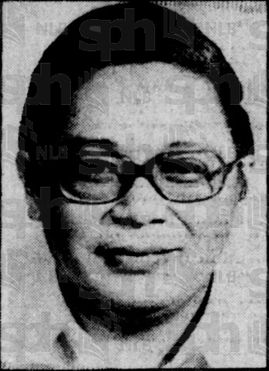
On the evening of 12 December 1993, Lee Kok Cheong was at his home in Greenleaf Place along Holland Road, when three youths entered his house to commit robbery. Two of the attackers stabbed Lee, then strangled him, which caused his death. Lee, an associate professor at the National University of Singapore, was 54 years old at the time of his death.
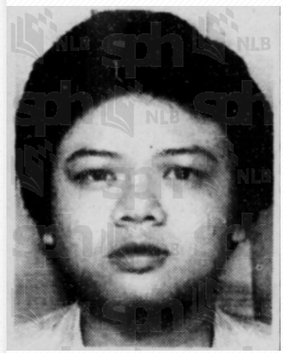
On 28 January 1989, 26-year-old Lim Lee Tin, a Chinese Singaporean woman who was often dressed like a male, was found murdered at a Chinese cemetery in Choa Chu Kang, Singapore. She was initially mistaken as a man before the autopsy revealed her true gender. The perpetrators of her murder were Lim's gambling partner and married housewife Chin Seow Noi, Chin's brother Chin Yaw Kim, and the siblings' friend Ng Kim Heng. The three suspects, who were all Malaysians, were said to have plotted the murder to get rid of Lim, who often harassed Chin Seow Noi for money.

Ng Soo Hin, a 19-year-old Singaporean carpenter, was charged in March 1990 with the murders of two women Ng Lee Kheng and Foo Chin Chin, and both victims were each other's best friends, while Foo was Ng's girlfriend. At two different locations, both women were found dead on that same night of 24 March 1990, with the first victim Ng being discovered dead due to a fall from one of the HDB flats at Circuit Road, while the second victim Foo was found dead with 14 stab wounds at East Coast Park. While the killings themselves stirred the whole nation, the killer Ng, who eventually stood trial for solely Foo's murder, tried to raise a defence of diminished responsibility to rebut the murder charge against him, but after he was found to be mentally sound at the time of the two murders, the trial court found Ng Soo Hin guilty and sentenced him to death.
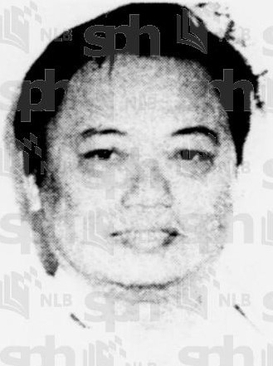
On 11 April 1989, 56-year-old goldsmith Phang Tee Wah was kidnapped by two men before he was murdered. Despite his death, the kidnappers demanded ransom from Phang's family, who were kept in the dark about Phang's death as they contacted the police about their predicament and the crime. Subsequently, four days after Phang was killed, his corpse was discovered and the police were able to nab the two kidnappers - Phang's former employee Liow Han Heng and security guard Ibrahim bin Masod, who was Liow's friend and driver.

On 16 October 1990, four days after her disappearance, 30-year-old Tan Hui Ngin was found dead at a disused egg hatchery nearby her home at Punggol, and when her decomposed body was discovered, Tan was half-naked and had fractures to her skull, and showed signs of possible sexual assault before her death. Five months later, with the assistance from the Malaysian police, a suspect was finally arrested and brought back to Singapore to be charged with the brutal rape-murder of Tan. The killer, Tan's 30-year-old childhood friend Lim Lye Hock, was eventually found guilty of murdering Tan and sentenced to death on 1 December 1993.

On 2 November 1984, 19-year-old interior designer Lim Hwee Huang was thrown off a tenth storey HDB flat at Kallang Bahru, after she was raped by 27-year-old Eurasian Singaporean Hensley Anthony Neville, who fled to the neighbouring country Malaysia. He was on the run for more than two years before he was finally arrested by Malaysian police, who sent him back to Singapore in March 1987 for the charge of murdering Lim. Neville, who was caught in the Malaysian state of Selangor, was also a suspect behind two unsolved killings in Malaysia.
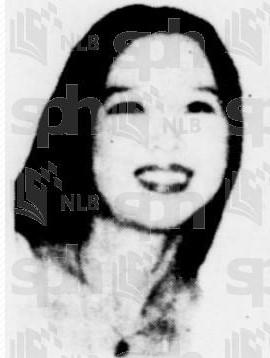
On 28 March 1983, 28-year-old housewife Soh Lee Lee and her two young children, three-year-old Jeremy Yeong Yin Kit and two-year-old Joyce Yeong Pei Ling, were brutally murdered inside their flat at Ang Mo Kio. Some of their possessions were stolen from the flat. The police investigated the case and within a month, they arrested two suspects, Lim Beng Hai and Michael Tan Teow, for the killings. One of them, Tan, was Soh's tenant.

On 31 October 1983, a 66-year-old woman named Chong Kin Meng was found murdered inside her Clementi flat by her foster son's wife. The police investigated and they managed to arrest a suspect for her murder a month later. The 23-year-old suspect, Teo Boon Ann, was found to have entered the flat under the pretense of providing Chong's foster son a wedding invitation card and a gift in his father's name, before he proceeded to kill her during a robbery attempt.

Ng Theng Shuang was a Penang-born Malaysian and criminal who was one of the two armed robbers involved in a robbery attempt of the Tin Sing Goldsmiths at South Bridge Road in November 1992.

On 27 October 1990, a thirty-year-old Malaysian named Lim Yeow Chuan, who was a transvestite, was found dead at Johore Road within Bugis, where it was a hotspot for prostitution of transvestites prior to its demolition in the 1990s. According to his colleagues, Lim was last seen with two young Indian men before he was discovered dead. In January 1991, two suspects - consisting of one Malaysian and one Singaporean - were arrested and charged with his murder. Later, while the Singaporean suspect Kuppiah s/o Saravanan was sentenced to five years' jail and twelve strokes of the cane for robbery, the Malaysian suspect Soosay a/l Sinnappen remained facing a murder charge.
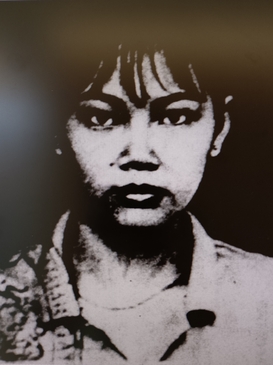
On 25 March 1999, an 18-year-old woman Malaysian named Koh Mew Chin was found murdered in her rented flat at Singapore's Pasir Ris, where she lived with her boyfriend and several other Malaysians working in Singapore. A day after the killing, Koh's 19-year-old boyfriend Chan Choon Wai, also Malaysian, was arrested and charged with murder.

On 22 November 1990, 20-year-old National Serviceman Lee Teck Sang, who deserted from his army and hid himself at the campus of Singapore Polytechnic for 17 days, used a knife to murder a 45-year-old lecturer during a robbery. The victim, Tan Chin Liong, died as a result of being stabbed thrice. Although Lee claimed that he only meant to rob and the stabbing was meant to incapacitate Tan, the High Court rejected Lee's defence and found Lee guilty of murdering Tan, and sentenced him to death. Lee's appeal was dismissed and he was hanged on 29 July 1994.

On 8 August 1995, a 26-year-old prostitute named Ching Bee Ing was stabbed seven times by her 35-year-old co-worker Teo Kim Hong at a brothel along Teck Lim Road. Ching, a Malaysian, died as a result of four fatal knife wounds to her liver and heart. Teo, a Singaporean, was charged with murder after she was arrested for the brutal stabbing. Teo was found guilty and sentenced to death in January 1996, and after the loss of her appeal, Teo was hanged on 30 August 1996.

On 11 August 1998, 43-year-old Ooi Ang Yen, a divorced mother of four and a factory production worker, was stabbed to death by her ex-boyfriend at a carpark nearby her workplace in Bukit Merah, Singapore. Her 41-year-old boyfriend and married father of two, Chan Chim Yee, was arrested 12 days later and charged with murder. According to court documents and media, Ooi wanted to leave Chan in favor of another man, and therefore, Chan went to the victim's workplace and attacked her with a knife. Although Chan raised two defences of an alibi and diminished responsibility, the trial court rejected his defences and therefore, Chan was found guilty of murdering Ooi and sentenced to death. Chan's appeal was dismissed and he was hanged on 15 September 2000.

On 28 December 1995, 82-year-old opium addict Ng Gee Seh, alias Ng Ee Seng, was found murdered in his flat at North Bridge Road, Singapore. Ng, who worked as a ragpicker, was slashed to death on the neck by his attacker, who surrendered himself days after the brutal killing. The Malaysian-born suspect, Ong Teng Siew, stated that he was suffering from intoxication of alcohol and opium and was also provoked by alleged insults from Ng leading to his homocide.
On 3 June 1999, seven-year-old Andy Ang Wei Jie collapsed in his home and died due to multiple injuries on his body. Four years later, Ang's mother and her boyfriend were both arrested for murdering him, and it was revealed that the boyfriend, Chong Keng Chye, had ruthlessly and relentlessly abused the boy from October 1998 until 3 June 1999, when the boy died.
On 22 September 2005, 37-year-old film-maker Ho Kien Leong, alias Jayson Ho, was found dead inside his flat at Indus Road, Bukit Merah, and he was certified to be stabbed to death around nine days before his highly decomposed corpse was found. Ho's killer, Lim Ah Liang, was arrested in Johor, Malaysia, where he was hiding after he killed Ho by stabbing him 13 times during an argument, and Lim was extradited back to Singapore to be investigated for killing Ho. Originally charged with murder, Lim, who suffered from depression at the time of the murder, was found guilty of manslaughter and sentenced to life imprisonment on 17 January 2007. Lim later lost his appeal for a lower jail term and is currently in prison serving his life sentence since 2005.

On 13 November 1985, 33-year-old Indonesian fish merchant Nurdin Nguan Song was murdered at a hotel along Waterloo Street, Singapore. Nurdin died after he was slashed and stabbed repeatedly by two men, who were revealed to have been paid by Nurdin's business rival to attack him. Between 1988 and 1992, the two murderers were arrested after spending several years on the run from the police, and charged with murder. One of them, a Malaysian named Loh Yoon Seong, was found guilty of murdering Nurdin and sentenced to death, while the other, a Singaporean named Tan Swee Hoon, pleaded guilty to manslaughter and for having killed Nurdin and committed an armed robbery while on the run, Tan was jailed for 23 years and given 24 strokes of the cane.
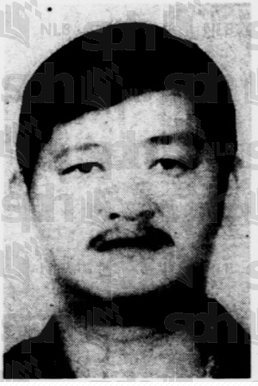
On 12 March 1997, a loan shark named Tan Tiong Huat was shot to death at a carpark in Singapore's Beach Road. The suspected gunman fled Singapore for Thailand, where he was eventually caught and extradited back to Singapore for trial seven years later. The gunman, Lim Thian Lai, was charged with murdering Tan before he was put on trial for an amended charge of illegally discharging a firearm to cause death. Although Lim put up a defense that he was innocent and it was another person who killed Tan, the trial court found him guilty of shooting Tan to death under the Arms Offences Act and sentenced him to the mandatory death penalty for the crime.

On 24 October 1983, 24-year-old Singaporean housewife Khor Gek Hong was attacked and stabbed to death by her lover along Kim Seng Road, Singapore. Khor's lover, 31-year-old welder Wong Foot Ling, surrendered himself two days after the fatal stabbing, and he was charged with murder. During Wong's trial, it was revealed that Wong was angered at Khor choosing to return to her husband rather than continuing their relationship with one another, and it caused Wong to commit the murder. Although Wong raised the defences of having killed Khor in a fight and killing Khor under a loss of self-control via sudden and grave provocation, the High Court judged that Wong had intentionally stabbed Khor, which in turn caused Khor to die from her wounds and hence, Wong was found guilty of murder and sentenced to death by hanging in August 1984. Wong's appeal was dismissed and he was hanged on 19 September 1986.



















